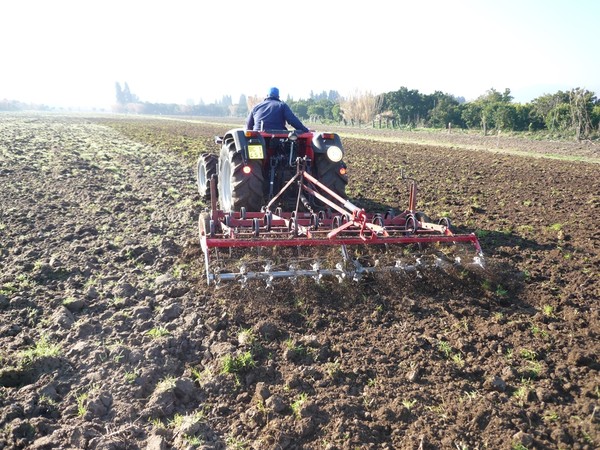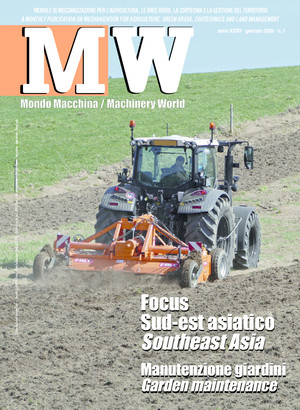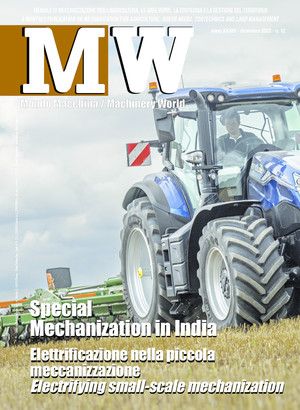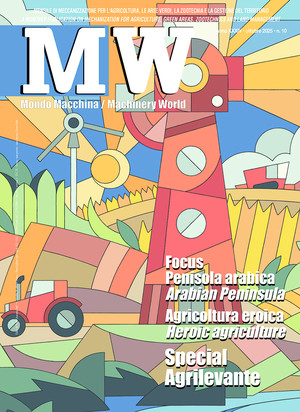
Agriculture and legality: the contribution of mechanics to the "Free Land Consortium"
For a number of years, in collaboration with a group of agricultural machinery manufacturers, the University of Pisa has been pursuing a program of experiments and consultation with the young farmers' cooperatives which manages farms seized from the Mafia. The experience has been interesting from a technical point of view, as regards a vocation for organic farming on the farms taken into custody and ethical and civil considerations.
The Free Land Consortium is made up of a number of farmers’ cooperatives working lands seized from the Mafia to transform the way they are farmed, after they were greatly degraded by criminal organizations, through legally productive and remunerative operations. As these lands are managed as organic farms, maximum environmental safeguards are enforced which enhance the ethical value of these activities. The young farmers in these cooperatives often have limited or no experience of running a farming enterprise but many are motivated to come to grips with this challenge. On these terms, these young “heroes” can count on stable and fairly remunerative jobs but are also forced to face hostility, acts of sabotage and perennial threats leveled by criminals whose land was taken into custody. The purpose is thus to show that even in the agricultural sector it is possible to bring, or return, a fully legal management system to a setting previously ruined by the Mafia.
The Agrarian Mechanics Department of the DiSAAA-a of the University of Pisa has maintained direct contact with these cooperatives, mainly through activities in the field based on organic farming mechanization and opened collaboration with the Free Land Consortium a few years ago. This collaboration involves consultation on defining appropriate forms of management by adopting strategies and machinery suitable for various conditions. The purpose here is to optimize organic farming management and maximize the production and financial results to thereby foster the growth of the cooperatives.
The University of Pisa collaboration began in 2010 with the Valle del Marro Cooperative and continued with the Terre Ioniche Cooperation, both in Calabria, through a non-profit arrangement for consultation, training and the transfer of the research results in the mechanization sector to organic farming. Agricultural machinery manufacturers have also been involved in this work and have show great consideration by providing machinery and equipment suitably equipped at “knocked down” prices. These issues were eventually taken up in a specific conference organized by FederUnacoma, the Italian Federation of Agricultural Machinery Manufacturers, and AIIA, the Italian Society of Agricultural Engineering, in cooperation with, and the support of, the University of Pisa, the Free Land Consortium and the Region of Calabria, to coincide with the 2014 edition of the EIMA International Exposition. The event drew great participation of the members of the public, many of them young people. The final message agreed on was one of an active participation of everyone in a mentality of legality for the virtuous use of confiscated Mafia lands.
The activities
Collaboration initially called for a number of preliminary meetings needed for the priority objectives to reach, strategies to pursue and related scheduling for setting them in motion.
The surveys which followed in Calabria made it possible to evaluate the major agro-environmental characteristics and gain an understanding of the production arrangements and types of management to adopt.
Later on, when the strategies to apply were mapped out and the appropriate machinery according to type and available power was identified, manufacturers of machinery and equipment were contacted for dealing with the specific techniques involved and the equipment required. In this connection, it is now opportune to cite and thank the companies which joined the initiative with great enthusiasm: Agribal, Donati, Gruppo Nardi, Marchetti, MIPE-Viviani srl, Nobili and Spapperi. The thermal treatment equipment designed and built by the University of Pisa was, on the other hand, was provided free of charge. The focus was trained mainly on the correct and safe use of the equipment, setting it up and regulating it.
Once the members of the cooperative had been trained, researchers followed the operations through telephone consultation and by periodically arriving on the farm sites. The research group also brought in a horticultural biologist, Giulio Ciampana from Montalto di Castro, who was strongly motivated by the ethical side of the project.
The forms of management applied by the cooperatives did not always produce good results. An example was the repeated use of soil treatment machinery by the Valle del Marro Cooperative which resulted in substantial infestations of species of rhizomatous and stoloniferous weeds. Thus the strategy applied for preparing the seedbed was the use of equipment with static tools such as harrows with flexible tines combined with cage rollers and a “false seeding” technique by deploying a tine harrow for repeated passages and successive selective controls of post-emergence of the infestations in the crop performed by a precision weeder equipped with a driving system and flexible tools allowing the removal of weeds in the row to drastically reduce recourse to manual weeding.
The Terra Ioniche Cooperative, producing conservation cereals and legumes, used a hydro-pneumatic cultivator equipped with twist tools capable of not only creating vertical holes in the soil but also burying appreciable amounts of the biomass on the surface. It was decided to follow this operation with a disc harrow for a rough preparation of the seedbed. Seeding was performed with a seed drill for planting in parallel furrows equipped for work with flexible tools capable self-cleaning on soils which were not perfectly refined or contained stones. Also in this case, ahead of planting a false seeding technique was applied using a tine harrow. For the management of organic fennel, the soil was refined more and then given raised seedbeds. False seeding was also used on “slut” terrain with a tine harrow followed by transplanting with a three-row transplanter. Post-emergence was performed with a precision weeder equipped with a drop fertilizer spreader for fertilization of the cover.
Some rethinking...
This cooperation has produced excellent results up to the present by shedding light on the central role of the human factor for the success of operations which appear to be only technical, such as those regarding the correct choice of the agricultural machinery to use.
Personal relationships, sharing, respect, friendship and mutual esteem between the members of the Free Land Consortium and the researchers, the manufacturers and professional farmers have, in fact, created a relevant synergy and strong affinity based also on the understanding of “rowing in the same direction”, that is, toward a mentality of legality not only for the management of farm work on the lands taken over from the Mafia but also in the training of students and the transmission of know-how and yet more know-how.
Though there is the awareness that this is only a tiny grain of sand for these young heroes experiencing denial of the Mafia at first hand, we hope that it serves to stimulate other colleagues and other manufacturers and business people to pursue this virtuous path and intensify and enrich the experience with further contents because, when all is said and done, many tiny grains can make up a mountain.








